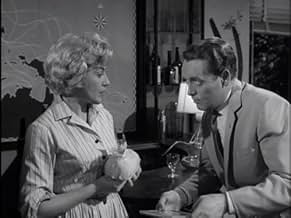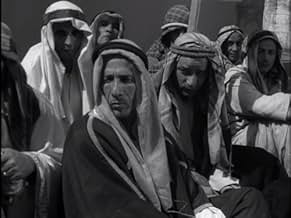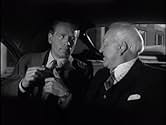PUNTUACIÓN EN IMDb
7,9/10
1,5 mil
TU PUNTUACIÓN
Añade un argumento en tu idiomaJohn Drake is a special operative for NATO, specializing in security assignments against any subversive element which threatened world peace.John Drake is a special operative for NATO, specializing in security assignments against any subversive element which threatened world peace.John Drake is a special operative for NATO, specializing in security assignments against any subversive element which threatened world peace.
Explorar episodios
Reseñas destacadas
The pedigree for "Danger Man" is a bit confusing. So, I'll try to make sense of it. The show was on for one season and each episode lasted about 23 minutes. Three years later, an hour-long series was created and was called "The Secret Agent"--with Patrick McGoohan once again playing an international 'fixer', John Drake. Then, after this series ended, McGoohan made "The Prisoner"--a show which MIGHT be a sequel to "The Secret Agent"...or it might not. This is because McGoohan's character is not referred to by name...he's just called Number 6. And, you aren't sure whether or not it's meant as a follow-up or not--and I can only assume that the television folks deliberately kept it vague.
"Danger Man" begins oddly. It explains that John Drake is a sort of international agent--a guy who goes on special assignments for many NATO nations. His nationality is a bit vague and this works reasonably well since McGoohan has an American/Irish/British background, though they seem to imply he's from New England (but the accent clearly ISN'T). Each episode is set in a different locale around the world and, amazingly, the show is wrapped up in about 23 minutes. The show is very well written and interesting--and McGoohan is excellent. The only serious complaint is that the shows sometimes were too hasty and many would have benefited from an hour-long format--something they would get with "The Secret Agent". Well worth seeing and a clever show. Even the sub-par episodes are good--making it at least more consistent than "The Prisoner".
A few final observations. The DVD copy is just fine but there really are no special features or captions. Also, as an American born and raised in the Washington, DC area, the introduction makes me laugh. That's because a HUGE office building is superimposed next to the US capitol building. There IS no building this size or that looks remotely like this in DC--now or then. Very strict building codes in the city prevent such monstrosities in the District.
"Danger Man" begins oddly. It explains that John Drake is a sort of international agent--a guy who goes on special assignments for many NATO nations. His nationality is a bit vague and this works reasonably well since McGoohan has an American/Irish/British background, though they seem to imply he's from New England (but the accent clearly ISN'T). Each episode is set in a different locale around the world and, amazingly, the show is wrapped up in about 23 minutes. The show is very well written and interesting--and McGoohan is excellent. The only serious complaint is that the shows sometimes were too hasty and many would have benefited from an hour-long format--something they would get with "The Secret Agent". Well worth seeing and a clever show. Even the sub-par episodes are good--making it at least more consistent than "The Prisoner".
A few final observations. The DVD copy is just fine but there really are no special features or captions. Also, as an American born and raised in the Washington, DC area, the introduction makes me laugh. That's because a HUGE office building is superimposed next to the US capitol building. There IS no building this size or that looks remotely like this in DC--now or then. Very strict building codes in the city prevent such monstrosities in the District.
In the "View from the Villa" agent John Drake pulls up in what looks like an Aston Martin DB4 or DB5, thus beating Sean Connery to the punch by several years. At least on the screen. I think it also appears in a few other episodes, but I am not certain.
I have spent the last few years slowly catching up on this superb series via net flicks. As other reviewers have noted already the plots were nearly always excellent. The understatement and laconic delivery of Mr. McGoohan a foretelling of others who would try the same style and mostly fail, except for the wonderful Le Carre adaptions, and Mr. Caine's superb Ipcress File. The satire of Establishment figures was often very droll.
In the current editions I am getting from Netflicks the music track is provided by a powerful jazz orchestra. What happened to the superb Harpsichord jazz music that I remember from the original UK broadcasts? So much more subtle and intriguing than the blaring band arrangement, although it does have a period flavor I cant deny.
Mr. McGoohan passed away recently. I will remember him and Danger Man as one of the very influential forces in my teenage years.
I have spent the last few years slowly catching up on this superb series via net flicks. As other reviewers have noted already the plots were nearly always excellent. The understatement and laconic delivery of Mr. McGoohan a foretelling of others who would try the same style and mostly fail, except for the wonderful Le Carre adaptions, and Mr. Caine's superb Ipcress File. The satire of Establishment figures was often very droll.
In the current editions I am getting from Netflicks the music track is provided by a powerful jazz orchestra. What happened to the superb Harpsichord jazz music that I remember from the original UK broadcasts? So much more subtle and intriguing than the blaring band arrangement, although it does have a period flavor I cant deny.
Mr. McGoohan passed away recently. I will remember him and Danger Man as one of the very influential forces in my teenage years.
British spies became all the rage in the 1960s, thanks largely to James Bond. However, the British television series "Danger Man" actually predated the James Bond movie series. Curiously, Danger Man's protagonist, NATO Agent John Drake, is probably unique in that the character started out as an American and then somehow "morphed" into an Englishman. In the first year Drake, played by Patrick McGoohan, was based out of Washington DC (the Capital Dome is clearly visible behind him in the opening credits) and he spoke with what passes in Britain as an American accent. In the succeeding years, however, Drake, still played by McGoohan, was based out of London and spoke with a distinct English accent.
What makes Danger man stand out, however, is the high level of intelligence that went into the series. Unlike other 1960s spies Drake did not rely on violence to solve the problems he was given and he almost never resorts to killing anyone. Instead he relied on trickery, maneuver and mind-games, rather than firearms or explosives. In fact, I understand that McGoohan actually turned down the role of James Bond because he objected to the excessive degree of gratuitous sex and violence in the series. In an era when gratuitous sex and violence is far more prevalent than it ever was in the early 1960s, Danger Man makes a refreshing change of pace.
What makes Danger man stand out, however, is the high level of intelligence that went into the series. Unlike other 1960s spies Drake did not rely on violence to solve the problems he was given and he almost never resorts to killing anyone. Instead he relied on trickery, maneuver and mind-games, rather than firearms or explosives. In fact, I understand that McGoohan actually turned down the role of James Bond because he objected to the excessive degree of gratuitous sex and violence in the series. In an era when gratuitous sex and violence is far more prevalent than it ever was in the early 1960s, Danger Man makes a refreshing change of pace.
There are so many things Ralph Smart got right in the earliest Danger Man, it's almost a pity he couldn't stick to the commercially problematic 30-minute format. The stories are taut, clever Cold War mystery-thrillers. Within the hurried time constraints it isn't all plot as Smart finds room for characterization and texture, even to interject some interesting ideas and questions. A lot of this is done by way of the mercurial Patrick McGoohan but Smart had no shortage of talented collaborators in directors and actors.
McGoohan's early performances are fluid yet quirky. While he projects a kind of reserved elan, he also draws on a trove of itchy, improvisational mannerisms that allow us into more than a few nooks--not all of them pleasant--of John Drake's anxious cynicism. (McGoohan is to the TV spook what the late Jeremy Brett was to Sherlock Holmes: a perturbable, high-strung exotic, haunted but smirking.) I prefer him here to the more celebrated Prisoner, in fact, where he's customarily arch and lacks the variety of situation and emotional register. His narration is another treat, delivered in one of the most delectably ironic voices in dramatic TV history.
The writing bests most on TV, then or now. The tone in the better scripts is wry, veering toward acid, with more than a hint of melancholy. This is not the Cold War as a stage for Kennedyesque moxie, and certainly not the idiotic glamorization found in Bond, but rather as in Le Carré, a stage for the peeling away of deceptions that are as likely to originate at home as in dens abroad. This is not to say it isn't above the occasional stereotype; see, for instance, the leering North Koreans in the episode The Honeymooners. But a mark of this generally very humane work is that it more typically treats nationalistic conceptions of the enemy with skepticism, and even pits Drake in frustration against his own morally ambiguous NATO bosses. Nor is the day always won, and some seeming victories prove Pyhrric. How refreshing this is to watch in 2007, for obvious reasons.
The production design, fairly cheapo and simplistic, never detracts (charmingly, old file inserts make do for exterior locations) and in fact the studio sets somehow hold surprise delights: here a gloomy early 60s facsimile of a Munich street recalling Carol Reed's chiaroscuro in The Third Man, there the lobby of an International Style hotel with its sexy mid-century modernism. That it's all in gorgeous high-contrast black and white only deepens the interest: shadow play for shadowy deeds.
A word too about the memorable score by Albert Elms, particularly his incidental music. The understated jazz is part and parcel of the sensibility here--aloof and insinuating. There is so much intelligence pulsing through Elms' music and the series as a whole that it seems vaguely unlikely; watching this work, I can't help but admire its virtues while ruing what's become of the medium.
Danger Man in this early incarnation is grown-up art on TV, the likes of which in the U.S., anyway, we rarely hope to find today outside of HBO, practically its last refuge. A treasure.
McGoohan's early performances are fluid yet quirky. While he projects a kind of reserved elan, he also draws on a trove of itchy, improvisational mannerisms that allow us into more than a few nooks--not all of them pleasant--of John Drake's anxious cynicism. (McGoohan is to the TV spook what the late Jeremy Brett was to Sherlock Holmes: a perturbable, high-strung exotic, haunted but smirking.) I prefer him here to the more celebrated Prisoner, in fact, where he's customarily arch and lacks the variety of situation and emotional register. His narration is another treat, delivered in one of the most delectably ironic voices in dramatic TV history.
The writing bests most on TV, then or now. The tone in the better scripts is wry, veering toward acid, with more than a hint of melancholy. This is not the Cold War as a stage for Kennedyesque moxie, and certainly not the idiotic glamorization found in Bond, but rather as in Le Carré, a stage for the peeling away of deceptions that are as likely to originate at home as in dens abroad. This is not to say it isn't above the occasional stereotype; see, for instance, the leering North Koreans in the episode The Honeymooners. But a mark of this generally very humane work is that it more typically treats nationalistic conceptions of the enemy with skepticism, and even pits Drake in frustration against his own morally ambiguous NATO bosses. Nor is the day always won, and some seeming victories prove Pyhrric. How refreshing this is to watch in 2007, for obvious reasons.
The production design, fairly cheapo and simplistic, never detracts (charmingly, old file inserts make do for exterior locations) and in fact the studio sets somehow hold surprise delights: here a gloomy early 60s facsimile of a Munich street recalling Carol Reed's chiaroscuro in The Third Man, there the lobby of an International Style hotel with its sexy mid-century modernism. That it's all in gorgeous high-contrast black and white only deepens the interest: shadow play for shadowy deeds.
A word too about the memorable score by Albert Elms, particularly his incidental music. The understated jazz is part and parcel of the sensibility here--aloof and insinuating. There is so much intelligence pulsing through Elms' music and the series as a whole that it seems vaguely unlikely; watching this work, I can't help but admire its virtues while ruing what's become of the medium.
Danger Man in this early incarnation is grown-up art on TV, the likes of which in the U.S., anyway, we rarely hope to find today outside of HBO, practically its last refuge. A treasure.
patrick mcgoohans's dicey 'new englander' accent notwithstanding, he's in fine form here. fast paced and inventive plots, exotic locales, and the extremely moral hero john drake all make the first series of danger man great television.
though he doesn't bed down with every girl he comes across, there's more than enough sexual tension to go around, as every female within a thirty-foot radius ends up throwing herself at johnny d. not keen on guns, drake's a master fighter and the resulting fight scenes are always fun to watch. his gadgets are realistic, much more believable than the ones used by bond or the man from wherever.
the very first episode, 'a view from the villa', takes us to portmeirion, PMG's inspiration for the village in 'the prisoner'. another one of the best television programs ever made.
you'll see a host of familiar faces in supporting roles here too. donald pleasance, barbara shelley--all kinds of great actors popped up on dm from time to time. by all means, if you're a fan of espionage shows, danger man should be high on your list of must-sees. it's got all the chewy goodness and none of the camp that marred so many spy programs in the sixties.
though he doesn't bed down with every girl he comes across, there's more than enough sexual tension to go around, as every female within a thirty-foot radius ends up throwing herself at johnny d. not keen on guns, drake's a master fighter and the resulting fight scenes are always fun to watch. his gadgets are realistic, much more believable than the ones used by bond or the man from wherever.
the very first episode, 'a view from the villa', takes us to portmeirion, PMG's inspiration for the village in 'the prisoner'. another one of the best television programs ever made.
you'll see a host of familiar faces in supporting roles here too. donald pleasance, barbara shelley--all kinds of great actors popped up on dm from time to time. by all means, if you're a fan of espionage shows, danger man should be high on your list of must-sees. it's got all the chewy goodness and none of the camp that marred so many spy programs in the sixties.
¿Sabías que...?
- CuriosidadesIn this early series, the character of John Drake is clearly defined as being an American. When the character returned for the second Cita con la muerte (1964) series, the character had become either British or Irish (exactly which was never settled upon definitively).
- Citas
John Drake: [Opening titles narration] Every government has its Secret Service branch: America, CIA; France, Deuxieme Bureau; England, MI5. NATO also has its own. A messy job? Well that's when they usually call on me, or someone like me. Oh yes: my name is Drake. John Drake.
- Créditos adicionales"Introducing Patrick McGoohan."
- Versiones alternativasIt has been reported that a foreign (non-UK) syndicated version of this series incorporated the American "Secret Agent Man" opening credits used for the later series "Danger Man" (1964), thereby tying the two series together. This has yet to be confirmed.
- ConexionesFeatured in Six Into One: The Prisoner File (1984)
Selecciones populares
Inicia sesión para calificar y añadir a tu lista para recibir recomendaciones personalizadas
Detalles
- Fecha de lanzamiento
- País de origen
- Sitio oficial
- Idioma
- Títulos en diferentes países
- Danger Man
- Localizaciones del rodaje
- Empresa productora
- Ver más compañías en los créditos en IMDbPro
- Duración
- 24min
- Color
- Relación de aspecto
- 1.33 : 1
Contribuir a esta página
Sugerir un cambio o añadir el contenido que falta









































